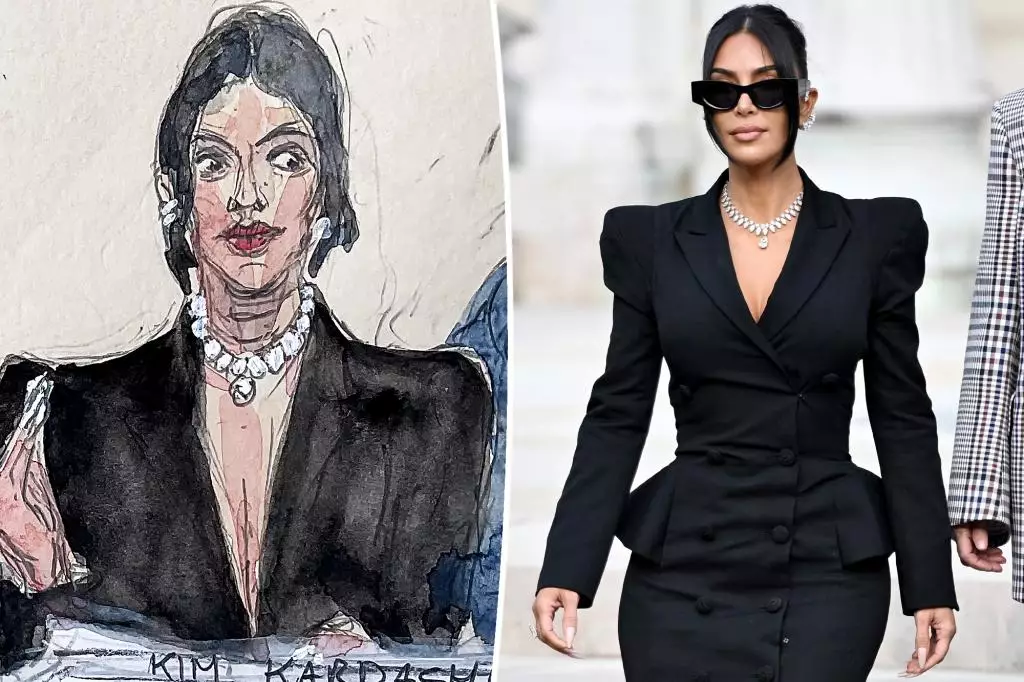The recent conviction of eight members of the infamous “grandpa robbers” gang, who stole an astonishing $10 million worth of jewelry from Kim Kardashian in a harrowing 2016 heist, sheds light on a complex interplay of crime, justice, and personal resilience. In a Paris courtroom, ringleader Aomar Aït Khedache received an eight-year prison sentence, of which five years are suspended, for orchestrating a crime that not only targeted a celebrity but also manifested broader implications for security and safety in public life. Ultimately, the leniency shown in the sentencing highlights the paradoxical nature of justice, particularly when age factors into criminal accountability.
Kardashian’s experience during the robbery remains profoundly memorable—the vivid details she shared during the trial unveil the stark reality of her vulnerability at that moment. “I absolutely thought I was going to die,” she testified, recounting the unbearable fear that gripped her as the robbers violated her sanctuary. The psychological scars of such an incident can transcend the tangible losses, revealing a deeper trauma that cannot be quantified merely by the stolen possessions.
A Tale of Two Outcomes: Justice and Sympathy
In a striking twist, two defendants, who allegedly acted as informants, were acquitted, highlighting the murky waters of criminal prosecution. The question of justice is often convoluted and fraught with moral dilemma. As Kim Kardashian herself noted in her statement following the verdict, there is a collective responsibility to ensure that systems promote fairness and respect for all involved.
The sentence, specifically geared towards accommodating the ages of the defendants—most being in their 60s and 70s—presents an ethical quandary. While compassion for older offenders is commendable, it raises vital questions about accountability. Should one’s years on earth serve to mitigate consequences for grave misdeeds, or do all individuals within the justice system deserve equal treatment regardless of age?
Kardashian’s views resonate with a larger audience that advocates for victims’ rights and systemic justice reform. Her response to the verdict underscores a transformative approach to personal experiences of violence and fear. Rather than wallow in bitterness, she expressed gratitude towards the French authorities—displaying not only a sense of closure but also a commitment to advocacy and healing.
Finding Strength in Vulnerability
The intricate layers surrounding Kardashian’s experience flop between victimhood and empowerment. By publicly confronting her fears and sharing her story, she illustrates a path toward healing that is not typically afforded to many who endure similar traumas. Her testimony serves as a beacon of hope for those grappling with various adversities, as it transforms the narrative from mere personal suffering into a call for societal change.
Moreover, Kardashian’s aspirations for rehabilitating the criminal justice system reflect a maturity and foresight that many may overlook when considering her public persona. She aims not only to advocate for herself as a victim but also for those incarcerated individuals seeking redemption and a chance for rehabilitation. This moment of growth offers a stark contrast to the sensationalism often associated with celebrity culture and invites a nuanced dialogue around the notion of justice itself.
As she embarks on moving forward, it is her resilience and capacity for personal growth that resonates most profoundly. The ordeal, while horrifying, has become a catalyst for her advocacy; thus, transforming tragedy into a platform for enacting change.
Anticipating Change: Beyond the Courtroom
Kardashian’s endeavors, motivated by her traumatic experience, prompt important discussions regarding how society perceives both crime and its victims. Through the lens of her story, one observes that celebrity status does not shield individuals from the repercussions of violent crime; rather, it reflects a universally human experience—the fragility of life.
By shifting the focus towards healing, Kardashian champions a dialogue about the restorative justice process, advocating that the aim is not merely punitive but also transformative. Victims deserve to be seen and heard, and their journeys can illuminate paths towards systemic change that benefits not only individuals grappling with the fallout of crime but society as a whole.
In essence, Kardashian’s experience transcends the anecdotal narrative of a celebrity heist; it embodies the human struggle for recovery, empowerment, and ultimately, justice in a world fraught with unpredictability and risks. Such stories empower individuals to seek transformation, not just for themselves but for society at large, offering hope and direction for others navigating their darkest moments.


Leave a Reply